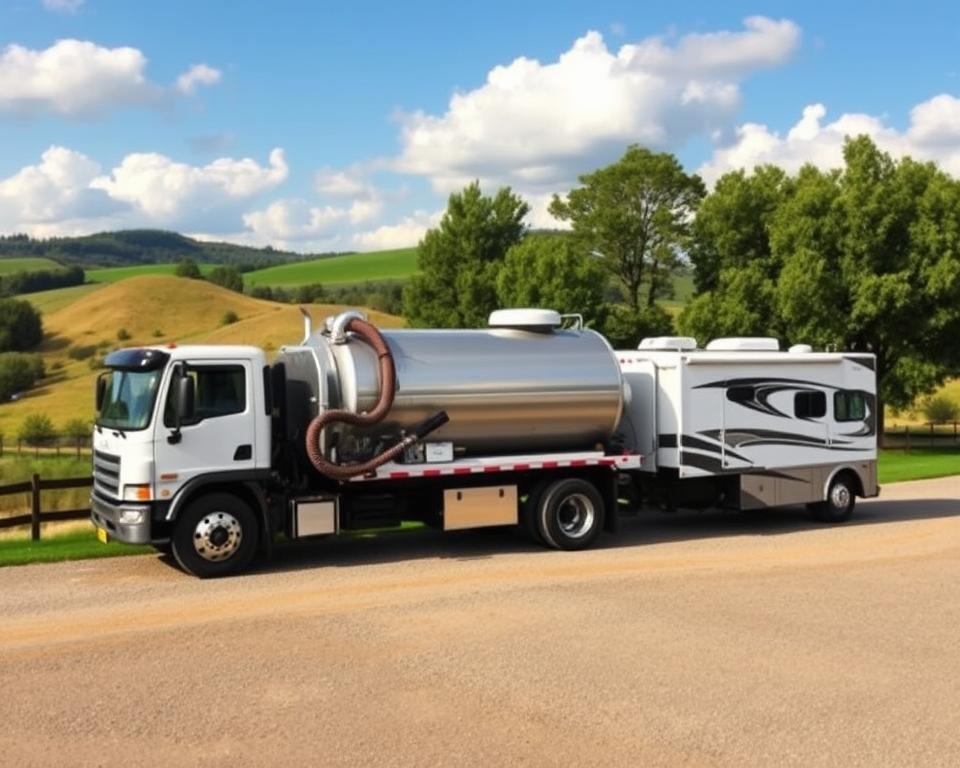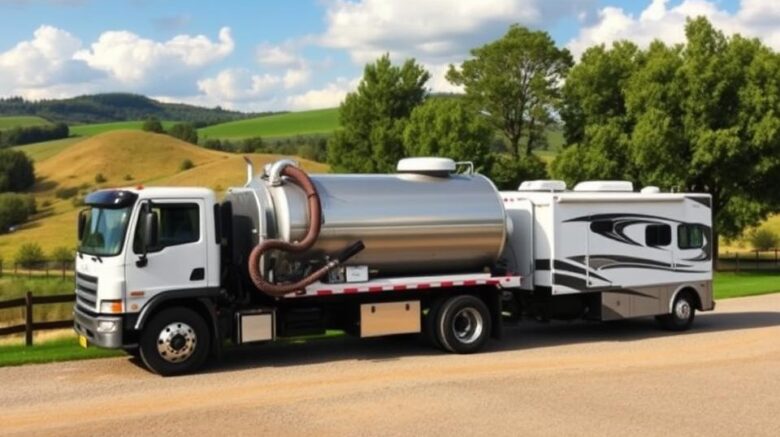RV Black-Water Pump: Vital Maintenance Advice
Is your RV’s black water pump really ready for the road, or might it bring about camping woes? Preserving your motorhome’s waste system in excellent order is imperative. It prevents bad smells, blockages, and expensive damage. We’ll share important advice to make sure your sewage pump runs without a hitch, keeping your travels trouble-free.
Understanding Your RV’s Plumbing System
The RV plumbing system is integral for any pleasant excursion. It splits into two main parts: the black water system and the gray water system – RV grey water pump. The black water system gathers waste from the toilet, and the gray water system processes wastewater from sinks and showers.
The systems feature drain lines that lead to different tanks, designed for streamlined waste management. Each tank has a vent to avert gas from building up, ensuring the operation is safe and smells fresh. Proper waste management in an RV is vital to prevent leaks or bad odors. By understanding both black and gray water tanks, RV owners can upkeep and manage waste better.
Grasping how your RV’s plumbing works allows early detection of issues before they worsen. Regular maintenance makes trips smoother for everyone. Staying ahead with your RV’s plumbing system delivers reliability during your travels.
Types of Tanks
Exploring RVs involves knowing the different tanks. Each one is vital to your RV’s system, demanding regular upkeep.
The fresh water tank stores consumption water. It’s necessary for a comfortable RV experience.
The gray water tank holds sink, shower, and other non-Septic wastewater. Handling this tank keeps your RV fresh while traveling. The black water tank, on the other hand, contains toilet waste. It needs routine emptying and attentive maintenance to avoid issues.
By understanding the fresh, gray, and black water tanks, RV owners can smoothly run their systems. This preparedness and continual maintenance ensure smooth functionality of the waste management system.
How RV Black Water Tanks Work
The working of the black water tank is key in RV waste management. It receives waste from the toilet via a gravity-fed system. Upon flushing, waste and water are channeled to the tank, to be stored until removal is necessary. It’s imperative to keep water levels optimized in the toilet to stop solid waste buildup.
Understanding how RV waste tanks function can circumvent clogs and odors. Without proper care, solid waste hardens, causing blockages and emptying difficulties. Thorough tank flushing techniques are essential to preventing these issues, guaranteeing smooth functionality.
Frequent inspection of tank mechanics is advised for RV owners. This includes observing flushing methods and maintaining adequate water flow. Practicing these essentials supports efficient tank maintenance, forestalling expensive fixes later.

Essential Maintenance Tips for Your RV Black Water Pump
Carrying out regular maintenance on your RV’s black water pump is imperative. Begin with choosing RV-safe toilet paper to reduce clogs and boost flow. A thorough flush can eliminate waste and curb bad smells. Consistently cleaning the tank helps stop residue buildup, guaranteeing your RV fresh and comfortable.
Perform frequent inspections to monitor your pump’s condition. Look for any signs of wear or damage that could affect its function. Using specialized tank treatments, like those from All in Sanitation, can markedly raise both performance and cleanliness. Following these tips can increase your pump’s life and enhance your RV’s living conditions.
Opt for RV-Specific Tissue
Caring for your RV’s black water system necessitates important habits. One prime tactic is using RV-safe toilet paper for clog prevention. This dedicated product decomposes quickly in water, suited for RV sanitation systems.
RV-safe toilet paper is essential for tank maintenance. It dissolves fast, avoiding blockages from slow-decomposing materials. This improves waste disposal efficiency and keeps the plumbing trouble-free.
Select brands identified as RV-safe when buying toilet paper. These products minimize clog risks and extend your black water tank‘s lifespan by sidestepping buildup. Regular use ensures a stress-free camping experience, void of plumbing troubles.
Thorough Tank Flushing
Thoroughly flushing your black water tank is key for smart waste management in your RV. To help waste movement, ensure the toilet bowl is properly topped up before flushing. Many RVs are equipped with built-in tank flush systems to make the process more efficient. For RVs without this feature, employing tank rinsers that attach to the sewer outlet offers a practical alternative.
Regular tank flushing assists waste removal and stops solid accumulations and bad smells. Continuing this process secures your RV stays fresh-smelling, making your travels more comfortable. A habit of regular and complete tank flushing will improve hygiene and the overall condition of your RV’s plumbing system.
Avoid Gunk through Routine Cleansing
Maintaining your RV’s black water tank unclogged is crucial for its efficient function. Frequent cleaning gets rid of lingering waste inside the tank walls. This means rinsing well with water and using specific RV tank cleaners for tough deposits.
By cleaning regularly, you prevent odors and cut down clog risks. A properly cleaned tank makes RVing better and helps your plumbing last longer. Include tank maintenance into your routine to deliver smooth travels.
Choosing Proper Chemicals
Choosing suitable chemicals for RV black water pump maintenance is critical for managing waste and minimizing smells. Many RV enthusiasts rely on enzyme-based RV holding tank treatments. These products use good bacteria to degrade solids and cut down bad odors.
Steering clear of harsh chemicals is essential to prevent damage to your plumbing. Such substances can damage pipes, leading to pricey replacements and diminishing your RV enjoyment. Employing safe chemicals for odor control protects your tank and pump’s longevity.
Maintaining your RV black water tank in excellent order enhances your travel experience. Using the right holding tank treatment regularly secures your system works well.
Timely Tank Emptying
It’s important to empty your RV’s black water tank at the correct moment for efficient waste removal. Aiming to do so when the tank is about two-thirds full is wise. This stops solid waste buildup, ensuring a quicker emptying process.
Dumping at designated stations is imperative for safe, eco-friendly waste handling. It’s vital to track the tank‘s levels closely. Letting it fill completely can create clogs and make disposal more difficult.
Proper timing and methods are essential for hygienic waste management and can increase your plumbing’s life. Staying vigilant and doing proper upkeep ensures a pleasant RV living experience.
Seal Checks & Care
Examining seals around the toilet and tank is vital for leak prevention. Over time, these seals might deteriorate, leading to odors and potential harm. A thorough inspection will uncover any wear or damage. Catching issues early makes possible quick replacement to secure a secure connection and odor-free RV.
Maintaining a bit of water in the toilet bowl helps in preserving seal condition. This protective habit is key in RV seal upkeep. It lengthens the seals’ life, halting leaks and foul odors.
Consistent seal maintenance can avoid hefty bills later. By paying attention to seal health, RV owners guarantee a pleasant journey.
Further Advice for Extended Maintenance
Booking professional servicing for your RV at least once a year is sensible, particularly for black water tank care. This strategy assists with identifying problems early and maintains your plumbing system’s integrity.
When preparing your RV for storage, completely clean and empty the black water tank first. Use antifreeze to protect from damage from remaining water during cold seasons. Taking this step is vital for protecting the system, making sure it’s ready for your next adventure.
Regular inspections and preventive actions are key to increasing your sanitation system’s life. Paying close attention to connections, hoses, and seals guarantees smooth operations. This approach improves your RV experience, making it enjoyable all year round.
Making sure your RV’s black water pump is well-maintained is crucial for a stress-free camping journey. By following the maintenance tips shared, you can preserve your black water system working efficiently. It’s essential to focus on consistent tidying, using correct flushing methods, and choosing appropriate chemicals for waste management.
By hitting these maintenance requirements, you will sidestep unpleasant odors and blockages. This also extends your RV plumbing system’s durability. Proactive care of the RV black water pump means more time enjoying the outdoors, absent potential setbacks.
Don’t forget, proper upkeep is key next time you gear up for an outing. It’s not the highlight of RV ownership, yet it significantly enhances your travel experience.
